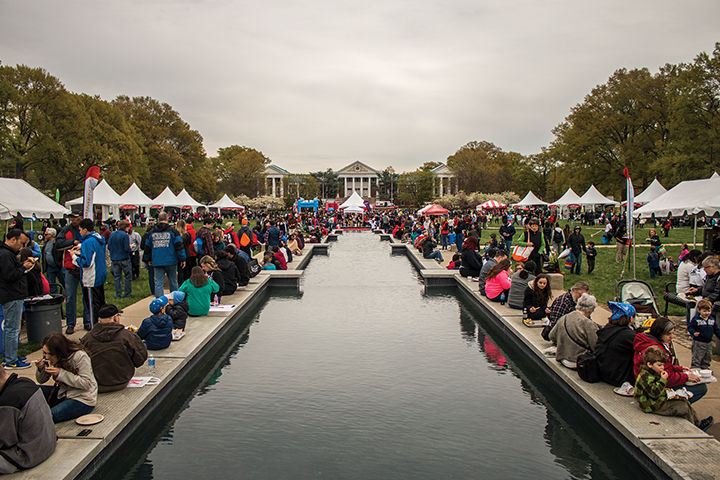On Tuesday, April 19, the Jewish Student Union sponsored Israel Fest, which had recreational and educational activities related to Israeli history, society and culture. Academic and student organizations that were represented included the Israel Studies department, Terps for Israel, the Maryland Hillel Center and J Street UMD. In front of the McKeldin Library, about 20 protesters gathered from Students for Justice in Palestine; there were protesters that had signs that said things such as “Zionism Kills” and other phrases equating Israel with apartheid. Eventually, they marched on McKeldin Mall to protest Israel Fest because it is a “celebration of what has built, founded, and [is] continuing apartheid and racism. You can’t celebrate something like that when it [is] so prevalent to the intrinsic nature of it.”
The roots of Zionism trace back to the experience of European Jewry. Theodor Herzl, the father of Zionism, believed that it didn’t matter where Jews went because they would be always considered outsiders, so they needed their own country. In the late 19th and early 20th century, Europe’s Jews migrated to places like America or Palestine to escape oppression and persecution. The aftermath of the Holocaust proved to Jews that Herzl was correct and that Jews needed their own country as a refuge from anti-Semitism.
The messages and tactics utilized by SJP is a problematic feature of the pro-Palestinian narrative, including the Boycott, Divestment and Sanctions movement. SJP propagates a false narrative by equating Israel with apartheid. Richard Goldstone, a former justice of the Constitutional Court of South Africa, asserted that the apartheid “is an unfair and inaccurate slander against Israel, calculated to retard rather than advance peace negotiations.” The definition of apartheid under the 1998 Rome Statute is “inhumane acts…committed in the context of an institutionalized regime of systematic oppression and domination by one racial group over any other racial group or groups and committed with the intention of maintaining that regime.” In Israel, Israeli Arabs make up 20 percent of the country’s population and have political parties and representatives in the Knesset, Israel’s parliament. Certainly, Israeli Arabs experience more de facto separation but, it’s not apartheid, as Goldstone remarked that “those who conflate the situations in Israel and the West Bank and liken both to South Africa do a disservice to all who hope for justice and peace.”
While supporters of SJP may not be anti-Semitic, their messages and actions appear to be so. For instance, SJP continuously uses the phrase “anti-Zionist,” which tends to translate as “anti-Jewish.” Their refusal to acknowledge the problem with their rhetoric is, quite frankly, naïve and foolish. An SJP protester claimed that “not every Zionist is Jewish and not every Jew is a Zionist.” While this may certainly be true, Zionism is the movement to re-establish a Jewish homeland, and, to an extent, history has taught Jews that Israel must exist. This does not mean that American Jews are not critical of Israeli policy related to the Palestinians nor does it mean that Jews are divided on Israeli policy.
The tactics of SJP convey an image that they are not interested in engaging in a meaningful debate on the Israeli-Palestinian conflict. Their tactics also convey a message that they are interested in propagating a false and misleading narrative of the conflict. Instead, SJP should engage the Jewish community in a dialogue about the complexities of the Israeli-Palestinian conflict. For instance, in response to the SJP protest, Samuel Fishman, vice president of the Jewish Student Union said, “We strongly advocate for an open, civil dialogue.” In addition, if SJP wants to educate people about the complexities of the Israeli-Palestinian conflict, then they should encourage students to enroll in courses offered by the Israel Studies department, such as ISRL329D: Understanding the Israeli-Palestinian Conflict through Opposing Histories, ISRL342: History of Modern Israel, ISLR349Q: Self and Other in Israeli Culture and ISRL448: Battle of the Narratives. The path they are currently heading down is not conducive to their goal of a Palestinian state.
Leslie McNamara is a public policy graduate student specializing in health policy. She can be reached at lamcnamar@gmail.com.



